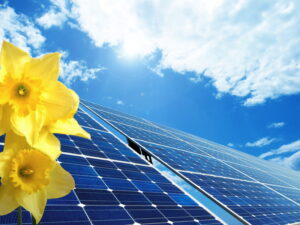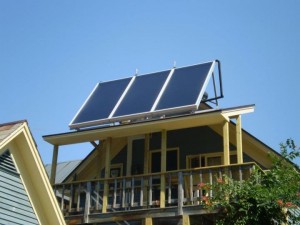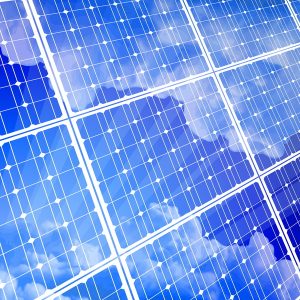As experts in solar energy, we understand the unique benefits of installing solar panels in Southern Vermont for your home. If you’re considering making the switch to solar, you’ve come to the right place. Let’s explore the top reasons why installing solar panels can be one of the best investments you make for your home.
(more…)Archive for the ‘Solar Power’ Category
The Best Reasons to Have Solar Panels Installed for Your Home
Monday, June 24th, 2024Benefits of a Solar Water Heater in the New Year
Monday, January 8th, 2024As we usher in another New Year, many of us are making resolutions to live a more eco-friendly and sustainable life. What better way to celebrate the start of a fresh year than by embracing renewable energy solutions? One such solution that can help you achieve your eco-friendly goals and save money at the same time is a solar water heater.
In this post, we’ll explore the numerous advantages of a solar water heater and why you should consider it as a part of your New Year’s resolutions. Plus, we’ll introduce you to HB Energy Solutions, your trusted partner for solar energy solutions.
(more…)Solar Power and Energy Efficiency: What You Should Know!
Monday, December 13th, 2021 The first thing homeowners tend to ask when presented with the opportunity to go solar in their home is, “is it worth it?” The short answer to this is, “yes, absolutely!” Sure, you’d probably expect us to say that, but allow us to elaborate!
The first thing homeowners tend to ask when presented with the opportunity to go solar in their home is, “is it worth it?” The short answer to this is, “yes, absolutely!” Sure, you’d probably expect us to say that, but allow us to elaborate!
With the number of advancements being made in solar energy technology throughout the last decade and beyond, right now it really is a great investment to go solar. Perhaps at this point, you’re thinking, “but it’s cloudy and grey for, like, half the year!” First off, that’s not entirely accurate and secondly, there are systems in place for this, including a battery backup for your solar system.
Additionally, homeowners qualify for a number of incentives by going solar, both federally and locally. So, if you’ve been considering getting solar panels installed to save money on your electricity needs, now is a perfect time! Read on to learn more.
Discover the Power of Solar Energy Systems
Tuesday, June 1st, 2021
When you talk to our team about solar energy and whether the investment is worth it, you’re going to hear us boast about the benefits. But we do more than just boast—we provide you with truly exceptional home services, and we can’t say enough good things about going solar.
Homeowners often find that they qualify for many incentives by choosing to harness solar energy, and there are other cost-saving benefits, too.
If you’ve ever thought about getting solar panels installed by our professionals so you can save money on your energy needs, there’s no time like the present to do so. Keep reading as we uncover the benefits and power of going solar. (more…)
Is Solar a Good Option in the Northeast?
Monday, November 16th, 2020 We live in and service an area of great natural beauty. The White Mountains of New Hampshire, the Green Mountains of Vermont—it really is no surprise that so many folks flock to our area for summer hikes, autumn leaf peeping, and winter skiing. They don’t seem to come around as much for mud season, but hey—we deserve something for ourselves, right? Considering the beauty around here, it’s no wonder that so many homeowners are interested in sustainability.
We live in and service an area of great natural beauty. The White Mountains of New Hampshire, the Green Mountains of Vermont—it really is no surprise that so many folks flock to our area for summer hikes, autumn leaf peeping, and winter skiing. They don’t seem to come around as much for mud season, but hey—we deserve something for ourselves, right? Considering the beauty around here, it’s no wonder that so many homeowners are interested in sustainability.
If you are one of those homeowners, then you have probably already considered the installation of a solar energy system. However, you may also have considered our snowy winters, gray evenings, and ice buildup. That may have driven you away from pursuing solar too far. We’re here to tell you, as your Southern Vermont solar power pros, that solar is in fact a very viable option in our area. You just need seasoned pros like our team on your side.
How Do Solar Energy Systems Work, Anyway?
Monday, September 10th, 2018 Sure, I’d like to go solar.
Sure, I’d like to go solar.
Sure, I’d like to save money when using electricity in my home.
Sure, I’d like to make the greener choice when it comes to powering my appliances and electronics.
Sure, it sounds great, but I can’t just count on the sun being out all of the time—so I guess solar is not for me, right?
Wrong.
We get it, you want to be able to use electricity in your home reliably. That means that you cannot really turn to solar power in Southern Vermont. Just think about how early it gets dark out in the winter season!
The fact is, however, that solar energy is a viable energy option, even if the sun goes down early (as it does for so much of the year around here). How is this possible? Well, keep reading for some more information regarding the way in which solar energy systems actually work.
How Solar Heating Benefits the Environment
Thursday, January 29th, 2015Solar heating involves the installation of solar collectors on the rooftop in order to harness the power of the sun to improve the efficiency of the home heating process. Consider how much your utilities decrease when you go out of town for a week. When you’re not relying on the utility companies for gas and electric heating, you save significantly, especially since we usually use our heating systems nearly nonstop day and night here in Southern Vermont. With solar heating, your system primarily depends on a free reliable source for energy: the sun. The sun’s rays have the power to transfer energy into your home for one specific purpose, like heating, or throughout the entire house.
Whenever you turn on your solar heating system, you’re not only saving money; you’re helping the environment as well. A solar heating system reduces your carbon footprint significantly, especially if you convert from an older standing pilot furnace. Standing pilot furnaces are no longer commonly manufactured, but they remain in some homes because their lifespan can be lengthy. Whereas today’s pilot lights operate on electronic ignition, turning on only when needed, standing pilots remained lit throughout the day, resulting in a lot of standby energy loss.
Replacing a standing pilot furnace with a solar energy system helps the environment in substantial ways, cutting down the amount of fossil fuels you use each year, reducing CO2 emissions that affect the environment. In fact, replacing any type of heating system with a solar-powered unit, from an electronic ignition gas furnace to a heat pump to an electric furnace can help to reduce your environmental impact. Any system that runs on gas, electricity, or any combination of the two contributes to greenhouse gases that pollute the air.
How It Works
Solar heating systems use solar collectors to collect thermal energy from the sun. A liquid such as water or antifreeze flows between the solar panels and a storage tank or heat exchanger. Storing the heated liquid for later is more efficient, but either system may need a backup for use when solar energy isn’t available.
Call HB Energy Solutions, we have installed solar heating systems in Southern Vermont for years, and strive to provide customers with excellent service for years to come.
The Different Types of Solar Hot Water Systems
Monday, August 4th, 2014When it comes to making a transition to using clean, renewable solar energy for your home, one of the best places to start is with a solar hot water system. Compared to other solar installations, solar water heaters are relatively inexpensive, quick to install, and take up little space. They make an excellent introduction to the advantages of using the power of the sun as a substitute for more expensive forms of energy.
Solar hot water systems for New Hampshire do not come in “one size fits all” configurations. There are different models and ways they use the Sun to heat water. The two main types are passive and active water heaters; there is also the option for direct systems. To find out which of these is the better installation for your home, call the solar professionals at HB Energy Solutions. We specialize in helping people find new ways to power their homes.
The basics of solar water heaters
Passive and active solar water heaters share many elements in common. They use a solar collector installed on the roof a home that absorbs energy from the sun. Inside the solar collector are tubes that hold refrigerant which collects the heat from the sun. The refrigerant then travels down to a water tank, where a heat exchanger moves the heat absorbed by the refrigerant to the water in the tank. (The water tank can also have a gas or electric heating system attached as a back-up should the solar collector not gather enough heat.)
Passive water heaters
A passive system does not use a pump to circulate the refrigerant from the collector plate and down into the heat exchanger, but instead relies on the convection current from the heated refrigerant itself. These systems are a less expensive option and require almost no maintenance because of the lack of moving parts. However, they are less efficient than active systems, and they must have protection from freezing during a New Hampshire winter.
Active water heaters
An active system uses pumps to circulate the refrigerant through the heat exchanger in the tank. These systems are much more efficient than passive systems and allow for more design freedom since the tank can be located farther away from the collector. Electronic controllers allow a homeowner more ways to adjust the system. Active systems do cost more than passive systems, however.
Direct water heaters
These solar hot water systes heaters do not use refrigerant or a heat exchanger. Instead they heat water directly using the solar collector. They are at risk of freezing and during hot weather can overheat, so they must be installed with caution—although they can potentially work in cold climate thanks to the development of freeze-tolerant solar collectors.
We highly recommend installing one of these solar hot water systems in New Hampshire for your home. The savings are immense: essentially, you receive free energy for your hot water.
Have the professionals at HB Energy Solutions recommend an ideal water heater model and then install it so it gives you excellent, worry-free performance.
What Is Involved with Photovoltaic Installation?
Friday, June 6th, 2014People today, especially in Vermont, are looking for paths toward clean, renewable energy that will both reduce the negative impact on the environment and also offer large savings on utility bills. Although harnessing renewable energy from sources such as the Sun and geothermal heat can cost money upfront, the work will pay back its initial costs many times over.
Solar power is one of the best known of all renewable energy sources: since the dawn of history, humans have watched the Sun in the sky, felt its heat, and sought a way to use it. Thanks to efficient photovoltaic panels, the dream of having the Sun working to power your own home is now a reality.
HB Energy Solutions is proud of the services we provide for green technology to our customers. For photovoltaic installation in Southern Vermont, call up our solar team today.
The PV installation job
Installing photovoltaic panels isn’t as difficult as you might imagine, although you will still need professionals to handle the task so that it works ideally. (Also, you don’t want to spend too much time climbing around your roof if it’s not necessary.)
Photovoltaic (PV) panels are mounted on the roof, where they change radiant heat from the sun into electrical energy. The number of panels necessary depends on how much power you require and how many systems you intend to run.
The installers plan out a configuration based on your needs. A team then lays down a support framework on the roof of the house. One by one, the PV panels are securely attached to the frame. Once the entire panel set is completed, the installers must connect the panels to the power grid and test the system to verify that it is correctly hooked up. They will check polarity, grounding, and wiring: the job isn’t over until they are certain that the system works as efficiently as it can.
Remember: the energy of the Sun is free. You will have some power requirements to run the indoor parts of the solar power system, but otherwise the electricity you receive through the PV cells costs you nothing: it should only take a few years for the solar power cells on the roof of your house to pay back their installation costs.
Talk to solar experts today
When you consult with a specialist in photovoltaic installation in Southern Vermont, you’ll find out how your home can best be set up for harnessing the free power of the sun.
At HB Energy Solutions, we not only offer solar solutions for homes, but for businesses as well—and that includes repairs and maintenance. Call us today to go green with the power of the Sun.
Who Invented Modern Solar Power?
Thursday, April 3rd, 2014We’ve sometimes heard people ask “Who invented solar power?” The answer is simple: the Sun invented solar power. As long as our solar system has existed, the star at the center of it, a massive engine of hydrogen and helium, has radiated energy to the planets.
However, if we narrow the question down to “Who invented modern solar power?”, the answer grows trickier. No single individual who can take all the credit for the solar cells we use today to capture the energy of the Sun and turn it into electricity.
Nonetheless, there are some key figures in the history of solar cells we can highlight. To receive the benefit of their amazing innovations in your home, call HB Energy Solutions for clean, renewable solar power in Southern Vermont.
A short history of solar energy as a source of electrical power
In 1839, French physicist A. E. Becquerel observed the photovalic effect: voltage or electric current created in material that is exposed to light. The next step came with the chemical element selenium; in 1877 W. G. Adams and R. E. Day published a paper in Britain on the photovalic effect in solid selenium. Eleven years later, Anglo-American chemist Edward Watson patented the “solar cell,” and Russian physicist Aleksandr Stoletov created the first solar cell based on an outside photoelectric effect. More patents followed in the U.S.
In 1904, German physicist Wilhelm Hallwachs used copper to make a semi-conductor solar cell, and it was the “Hallwachs-Effekt” that later became known as the photoelectric effect. The next year, the most famous name in the timeline of solar cells appeared: Albert Einstein published a paper to explain the Hallwach-Effekt as part of quantum physics. The photoelectric effect was at last proved in 1916 by Robert Milikan.
During the 1920s, solar power started to enter homes for the first time, although on a limited basis, when solar water heaters using flat-plate collectors were used in Florida and Southern California. In the 1950s, Bell Labs began to produce solar cells for space exploration using the growth of single-crystal silicon developed over the previous four decades, and they announced in 1954 the “first modern silicon solar cell.” The media started to report on solar power as a major mover in the future of energy.
In the 1960s, Hoffman Electronics increased solar cell efficiency, while spacecraft made use of solar energy for almost all their operation. In 1974, J. Baldwin developed a building in New Mexico that was exclusively heated and powered through solar and wind power. During the 1970s energy crisis, research into solar power as a renewable alternative to fossil fuels increased.
The rise in solar cell research has—so far—reached its peak in 2008 when the U.S. Department of Energy’s Renewable Energy Laboratory created the most efficient solar cell yet, with 40.8% efficiency.
No single person can take the credit for modern solar power’s creation, and at a certain point it became too broad field. But one thing is certain: your home can benefit from the free power of the Sun through photovalic cells. Call HB Energy Solutions and talk to our experts in solar power in Southern Vermont today.


Join Us Online